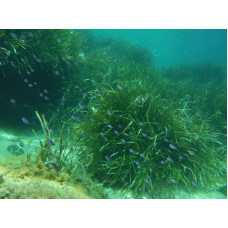An autotroph or primary producer is an organism that produces complex organic compounds (such as carbohydrates, fats, and proteins) using carbon from simple substances such as carbon dioxide, generally using energy from light (photosynthesis) or inorganic chemical reactions (chemosynthesis).
They convert an abiotic source of energy (e.g. light) into energy stored in organic compounds, which can be used by other organisms.
In the food chain, autotrophs serve as producers.
There are two groups of organisms: photoautotrophs (plants and blue-green algae) and chemoautotrophs (hydrogen and nitrophying bacteria).
The photoautotrophs are the main primary producers, converting the energy of the light into chemical energy through photosynthesis, ultimately building organic molecules from carbon dioxide.
Chemoautotrophs (single-celled organisms) produce biomass by oxidizing inorganic chemical compounds such as hydrogen, hydrogen sulfide, elemental sulfur, iron, and ammonia.
Autotroph
Tags: Autotroph

